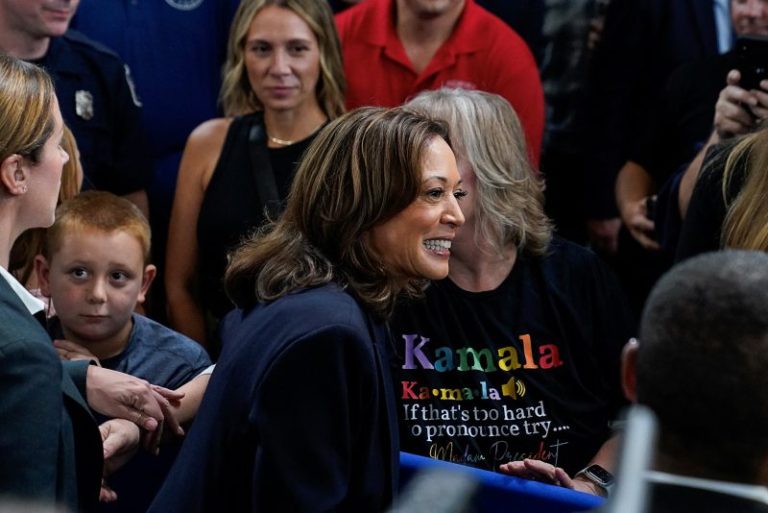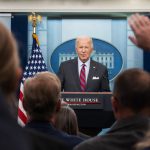FLINT, Mich. — Vice President Kamala Harris met with Arab American and Muslim leaders in Michigan on Friday, part of an ongoing effort to stem defections from a pivotal group of voters who have fiercely criticized President Joe Biden for his staunch support of Israel’s wars in Gaza and now Lebanon.
The meeting came during a campaign swing through the Rust Belt as Harris has tried to both shore up and showcase the multiracial, multiethnic and even bipartisan coalition she hopes will land her in the White House. Arab Americans make up an unusually large proportion of the Democratic electorate in Michigan, a state critical to Harris’s campaign strategy.
On Thursday, the vice president campaigned in Ripon, Wis., with former Rep. Liz Cheney of Wyoming, one of the most outspoken Republican critics of former president Donald Trump. Cheney and her father, former vice president Dick Cheney, endorsed Harris last month, and on Thursday the former conservative congresswoman said Harris would be the first Democrat she has ever voted for.
After the meeting with Muslim leaders, Harris was scheduled to speak at a campaign rally in Flint, a majority Black city whose 2014 water crisis became an international symbol of government neglecting the basic needs of its vulnerable citizens. That year, it emerged that a failure to add proper corrosion-control chemicals to the water supply had allowed lead to flow into homes and threaten the entire community.
Nearly a year after the Oct. 7 Hamas attack on Israel — in which militants rampaged through the Israel-Gaza border and killed 1,200 people while taking some 250 others hostage — the turmoil in the Middle East has metastasized into a larger regional conflagration. Prominent Arab American and Muslim leaders have blasted Biden’s ongoing military and diplomatic support of Israel, whose scorched-earth campaign in Gaza has killed more than 41,000 Palestinians, according to the Gaza Health Ministry, and fueled an ongoing humanitarian catastrophe.
In Michigan, a battleground state coveted by both Republicans and Democrats, about 300,000 residents claim ancestry from the Middle East or North Africa. Biden won Michigan by 154,000 votes in 2020, and Harris is expected to face another tightly contested election there.
Harris met with leaders from Emgage Action, a Muslim advocacy group that has endorsed her candidacy; the American Task Force on Lebanon; and Hala Hijazi, a prominent Palestinian-American activist who has been outspoken about the scores of family members she has lost in Gaza.
In a statement Friday, Emgage CEO Wa’el Alzayat said his organization sought to “underscore the deep pain our communities feel over the intensifying crisis in Gaza and Lebanon.”
“Emgage Action called on Vice President Harris to do everything in her power, should she win, to end the war and reset U.S. policy in the region,” Alzayat added. “Emgage Action also reiterated the organization and the Muslim community’s disappointment in President Biden’s handling of the crisis that is now widening to a broader regional war.”
In Michigan, where people of Lebanese descent make up a segment of the Arab American community, there is renewed anger about the administration’s support of Israel’s ground invasion of Lebanon that began late last month. Israeli airstrikes in Lebanon have grown more intense and deadly, with more than 1,400 people killed so far, according to Lebanese health authorities, including an American, Kamel Ahmad Jawad.
Israel has said it is conducting the operation to stop Lebanon-based Hezbollah from firing missiles into Israel, which it has been doing since the Oct. 7 attack, forcing the evacuation of thousands of Israelis.
The Arab American and Muslim community has been split over whether to support Harris and her running mate, Minnesota Gov. Tim Walz. Harris has been more empathetic and outspoken about Palestinian suffering than President Joe Biden, and has shown a greater willingness to directly criticize Israel, which many activists regard Republican Donald Trump as overtly anti-Muslim.
But she has not stated a policy distinct from Biden when it comes to supporting Israel, disappointing many leaders of the Arab American.
The Uncommitted National Movement, a group led by Arab Americans that urged Democratic primary voters in Michigan and other states to select “uncommitted” instead of voting for Biden, was not invited to Friday’s meeting, the group said in a statement on X.
“We’re hearing @VP will be meeting w/ Arab+Muslim groups supportive of her campaign. @uncommittedmvmt, though not invited, is glad our pressure is helping yield more engagement,” posted Abbas Alawieh, co-founder of the Uncommitted Movement. Alawieh called for Harris to promise that as president, she would stop sending weapons to Israel that are used for the assaults on Gaza and Lebanon.
On Thursday, a group called “Arab Americans for Harris-Walz” officially announced its formation, saying it was made up in part by former uncommitted voters. Harris, the announcement said, would be far more receptive to change than Trump, who unwaveringly supported Israeli Prime Minister Benjamin Netanyahu and moved the U.S. embassy to Jerusalem.
“Together, we can protect the future from the hands of anti-Arab bigots like Donald Trump and build one where our voices are heard, our values respected, and our communities prioritized,” the statement said. ‘Only with a Harris-Walz Administration can we even begin to imagine that vision.”
Harris concluded her time in the Midwest with a rally in Flint, whose water crisis remains a searing memory a decade after it was brought to light.
In 2014, Flint officials switched the city’s water source to change money, but they neglected to ensure there were adequate chemicals to control corrosion in the city’s water systems.
The mistake caused dangerous levels of lead, a neurotoxin, to leach into the water supply. Residents in the majority Black city — a third of whom live below the poverty line — complained to city and state leaders about the contaminated water coming out of their taps, but they were largely ignored. By the time authorities began to take corrective action, more than 100,000 people had been exposed to contaminated water.
A study released earlier this year showed school-aged children had suffered significant and lasting academic setbacks following the water contamination crisis.
Abutaleb contributed reporting from Washington, D.C.



